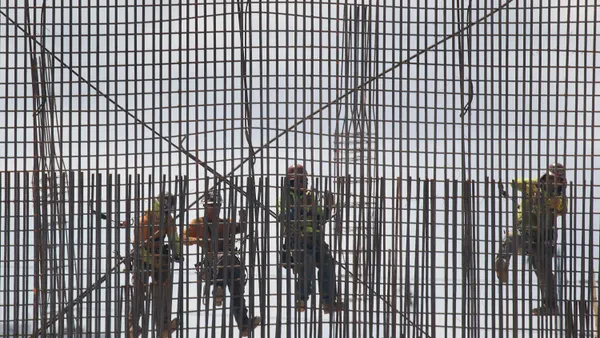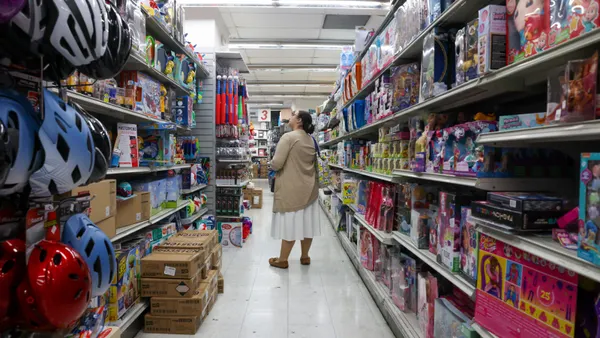Dive Brief:
- Republican and Democratic leaders traded blame for a government shutdown on Wednesday that put hundreds of thousands of workers on furlough, gave the Trump administration a potential opening to slash the federal workforce and imperiled the timely release of employment data and other reports vital to business decision-making.
- Republican leaders in the Senate on Tuesday failed to win enough votes to pass a stop-gap bill funding the government for seven weeks. Most Democrats voted against the bill while calling for the restoration of billions of dollars in healthcare funding, including Obamacare subsidies that expire this year.
- There are few winners from U.S. fiscal paralysis, according to economists. “Shutdowns don’t save money, they waste money,” Maya MacGuineas, president of the Committee for a Responsible Federal Budget, said in a statement. “We pay federal workers not to work and rent buildings that aren’t being used, all while requiring costly shutdown planning, inefficient allocation of government resources and a reduction in the services available to the American people,” she said.
Dive Insight:
Just hours before most U.S. federal agencies closed, the Bureau of Labor Statistics said it would not release on Friday highly anticipated data on hiring and other aspects of employment.
The pause in release of jobs data — and other critical reports such as an update on inflation in mid-October —may impede efforts by corporate leaders, investors and Federal Reserve policymakers to gauge the severity of a recent rise in price pressures and softening in the labor market.
Noting weak demand for workers and persistent inflation above 2%, Fed Chair Jerome Powell and other central bank officials have recently said they face greater difficulty meeting their dual mandate to ensure stable prices and full employment.
Policymakers flagged risks to the job market last month and trimmed borrowing costs by 0.25 percentage point while forecasting, in a median estimate, two more quarter-point cuts before 2026. The absence of fresh, credible data would complicate their efforts to correctly calibrate monetary policy.
“Risks to employment and sentiment are rising, along with economic policy uncertainty,” Scott Helfstein, head of investment strategy at Global X, said Wednesday in a statement. At the same time he noted that “the overarching economy remains healthy by most metrics.”
Damage to the economy from the shutdown, while limited over the short term, would grow over time, the Congressional Budget Office said Tuesday.
Roughly 750,000 federal employees could be furloughed at a compensation cost of $400 million per day, the CBO Director Phillip Swagel said in a letter to Sen. Joni Ernst, R-Iowa.
A five-week shutdown that ended on Jan. 25, 2019, led to the suspension of some federal services and delayed spending for compensation and for goods and services, CBO said.
While most of the loss in gross domestic product growth from the shutdown would be recovered, about $3 billion, or 0.02% of annual GDP, would be lost, CBO estimated at the time.
“The effects of a government shutdown on business activity are uncertain, and their magnitude would depend on the duration of a shutdown and on decisions made by the administration,” Swagel said in the letter.
“CBO expects that if a government shutdown persisted for several weeks, some private-sector entities would never recover all of the income they lost as a result of the suspension of federal activity,” he said.
President Donald Trump may use the shutdown as an opportunity to bypass opposition by Democrats and stage mass firings of federal workers.
The Office of Management and Budget, in line with Trump’s effort to shrink the federal government, early this week called on federal agencies to draw up plans for widespread firings during a shutdown.
“Despite the fact that we're in a shutdown, we're going to have to make things work, and that means that we're going to have to triage some certain things,” Vice President J.D. Vance said Wednesday.
“That means certain people are going to have to get laid off,” Vance said during a White House press conference, adding that the administration has not “made any final decisions about what we're going to do with certain workers.”
Vance blamed Senate Minority Leader Chuck Schumer and other Democrats for creating the impasse on federal spending, saying their chief aim is to restore health care funding for illegal immigrants.
Democratic Party leaders “shut down the government because they said to us, ‘We will open the government, but only if you give billions of dollars of funding for health care for illegal aliens,’” Vance said.
Schumer, writing on X, said Democrats want to avert a surge in healthcare premiums early next year for citizens who rely on Obamacare.
“Republicans shut down the government because they can’t be bothered to protect health care for Americans across this country,” the senator said on X.
“This didn't have to happen,” Schumer said on the Senate floor. “It happened because our Republican colleagues wanted to give tax breaks to billionaires.”
















